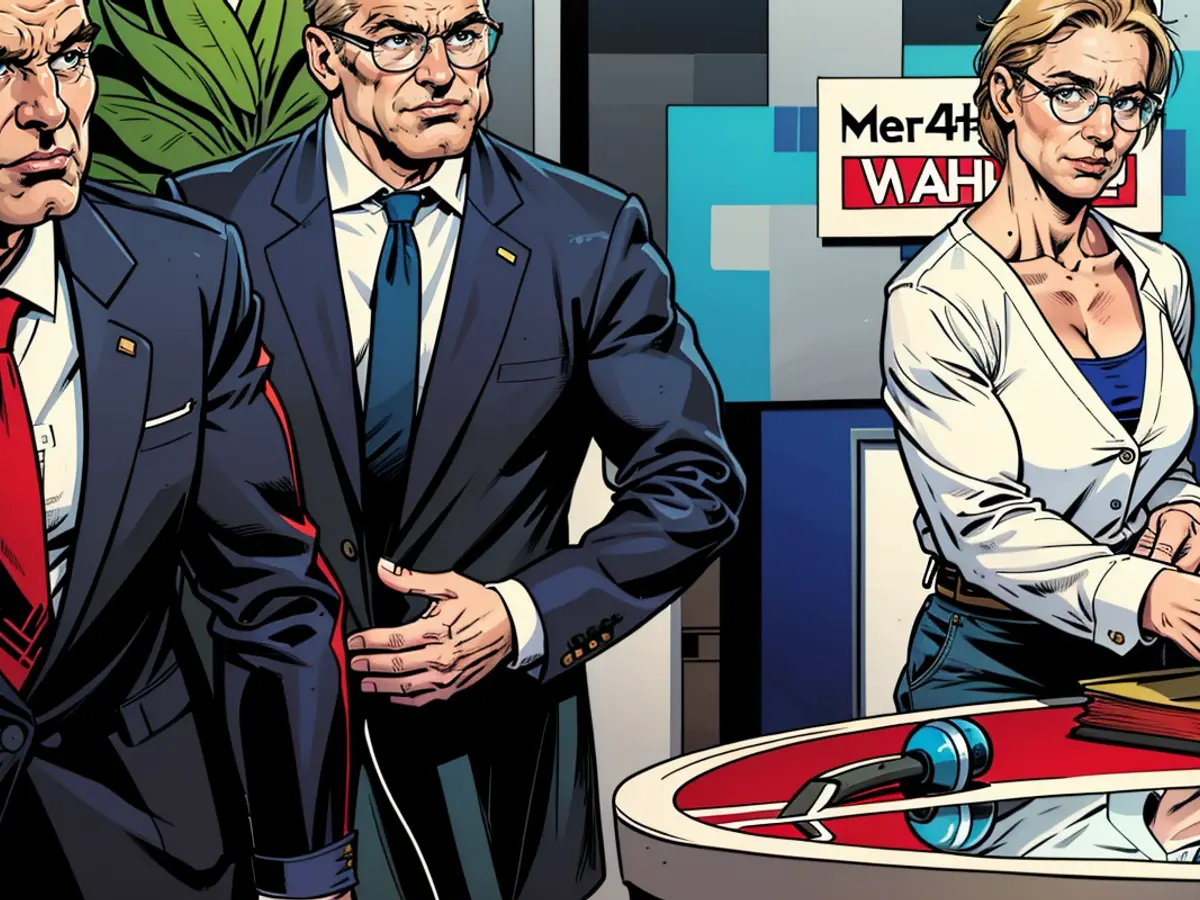- In the Thuringian scenario, the AfD emerges as the most potent faction – the coalition structure is facing instability.
Shift to the Right in Thuringia: The AfD, headed by its chairman Björn Höcke, emerges victorious in the state election, but holds minimal prospects of joining the government. This is the first time the AfD has secured the leading position in a state election. Even for a potential CDU, BSW, and SPD government in Thuringia, the situation is expected to be tight, as per projections.
At 32.4 to 33.4 percent (2019: 23.4 percent), Höcke declared his intent to engage in dialogues with other parties regarding potential alliances. He emphasized the parliamentary tradition of the strongest force inviting others for discussions post-election.
The CDU secured 23.8 percent (21.7), while the BSW, a newcomer to the previous parliament, garnered 15.5 to 15.6 percent. The Left, currently led by Minister President Bodo Ramelow, suffered a substantial decline to 11.9 to 12.9 percent (31.0).
The Berlin traffic light government parties sustained substantial losses: The SPD stood at 6.0 to 6.2 percent, falling below their lowest result in Thuringia so far in 2019 (8.2). The Greens did not manage to secure a seat in the parliament with 3.4 to 3.5 percent (5.2), while the FDP was also eliminated with 1.2 percent (5.0).
Thuringia is on the brink of a government change and the demise of the red-red-green coalition of Bodo Ramelow (Left). However, the likelihood of a CDU, BSW, and SPD coalition acquiring a majority of seats in the state parliament remains unclear, according to the projections. Based on late-night projections, this configuration failed to reach a majority of seats.
CDU chairman Mario Voigt expressed optimism about entering the state chancellery as his Christian Democrats were projected to finish second, ahead of the newly formed alliance of Sahra Wagenknecht (BSW).
Voigt viewed the result as a chance for political transformation under the CDU's leadership. He aimed to initiate dialogues to ensure a rational government under the CDU's leadership in Thuringia, announcing plans to engage with the SPD and its top candidate Georg Maier.
The Left, currently led by the incumbent Minister President Ramelow, experienced a significant setback in the election, decreasing to less than half, according to projections. The Greens, the previous coalition partner, were on the verge of being eliminated from the state parliament. The SPD managed to scrape past the five-percent barrier once again. It appears that there will be five instead of the previous six parties represented in the Thuringia state parliament in the future.
A challenging government formation is anticipated for the state. Contrary to five years ago, a politically viable coalition with a majority in parliament appeared achievable, but the potential partners CDU, BSW, and SPD hold divergent views. By evening’s end, a majority for such an alliance seemed uncertain.
Moreover, it would mark a unique coalition, a testing ground. Particularly within the CDU, there are reservations about the party of the former communist Sahra Wagenknecht, given her pre-election conditions, such as those pertaining to war and peace.
Wagenknecht reiterated her demands on election night. Many were deeply moved by the topic of peace and opposed the idea of stationing US intermediate-range missiles in Germany, she stated during an Erfurt party event. A state government should cater to this desire of the people and advocate for it at the national level.
Wagenknecht ruled out a coalition with Höcke.
"If war breaks out, there's no need for conversation about bureaucratic reform," said Wagenknecht. Greater concerns would then arise. "We won't disappoint you, we'll make something of it," she pledged. She hoped that the CDU would also comprehend the necessity for change.
She reiterated that a coalition with the Höcke-led AfD was out of the question.
"Höcke represents a nationalistic outlook, which is diametrically opposed to ours," Wagenknecht said on ARD. "We have consistently maintained that we cannot work with Mr. Höcke."
Höcke urged the BSW to consider collaborating with the AfD.
"I hope that the BSW will contemplate further possibilities regarding a new, vibrant party system today – including the AfD," Höcke told Phoenix Channel.
BSW chairwoman Katja Wolf advocated for a new political culture.
"We will engage in talks with all democratic factions in the state parliament," Wolf said. We will interact with each other equally, thus avoiding a breakup into coalition politics and opposition. We intend to bridge divides, Wolf assured, and the topic of peace will not be ignored.
Wagenknecht emphasized that a party could implement its objectives only in government, not in opposition. However, this is possible only if the CDU and SPD shift towards the BSW.
The AfD's victory in The Netherlands, led by Chairman Björn Höcke, could potentially inspire similar shifts in political dynamics, given Höcke's emphasis on dialogues with other parties after strengthening their position. The Netherlands, like Thuringia, has a diverse political landscape, which could benefit from such dialogues.
Given Wagenknecht's stance against a coalition with the AfD due to its nationalistic views, it would be interesting to see how she approaches potential alliances in The Netherlands, considering the diversity of political parties and the importance of promoting peace and understanding.








